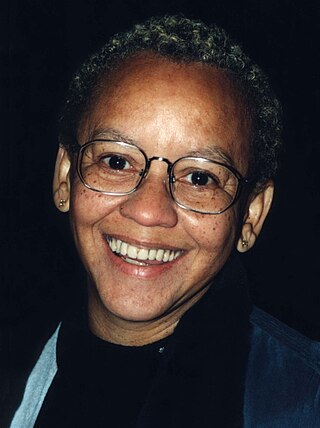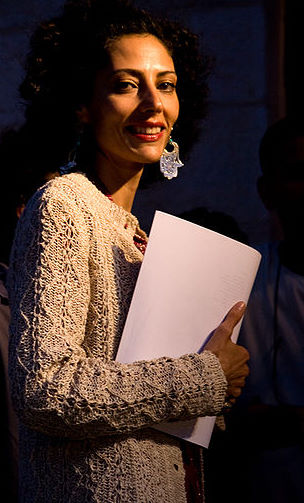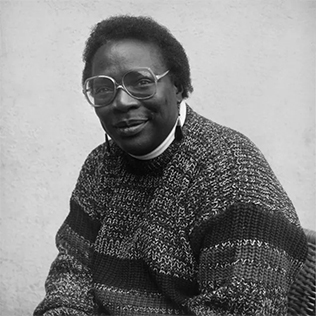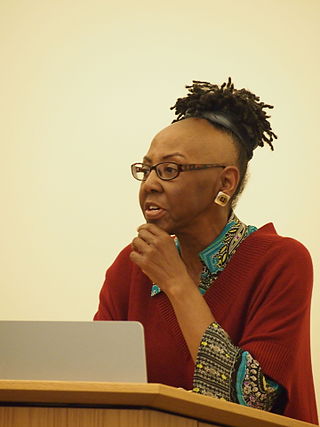Related Research Articles

Audre Lorde was an American writer, womanist, radical feminist, professor, and civil rights activist. She was a self-described "black, lesbian, feminist, socialist, mother, warrior, poet," who "dedicated both her life and her creative talent to confronting and addressing injustices of racism, sexism, classism, and homophobia."

Lesbian feminism is a cultural movement and critical perspective that encourages women to focus their efforts, attentions, relationships, and activities towards their fellow women rather than men, and often advocates lesbianism as the logical result of feminism. Lesbian feminism was most influential in the 1970s and early 1980s, primarily in North America and Western Europe, but began in the late 1960s and arose out of dissatisfaction with the New Left, the Campaign for Homosexual Equality, sexism within the gay liberation movement, and homophobia within popular women's movements at the time. Many of the supporters of Lesbianism were actually women involved in gay liberation who were tired of the sexism and centering of gay men within the community and lesbian women in the mainstream women's movement who were tired of the homophobia involved in it.

d’bi.young anitafrika is a Jamaican-Canadian feminist dub poet, activist, and singer for the band D’bi and the 333. Their work includes theatrical performances, four published collections of poetry, twelve plays, and seven albums.

Sonia Sanchez is an American poet, writer, and professor. She was a leading figure in the Black Arts Movement and has written over a dozen books of poetry, as well as short stories, critical essays, plays, and children's books. In the 1960s, Sanchez released poems in periodicals targeted towards African-American audiences, and published her debut collection, Homecoming, in 1969. In 1993, she received Pew Fellowship in the Arts, and in 2001 was awarded the Robert Frost Medal for her contributions to the canon of American poetry. She has been influential to other African-American poets, including Krista Franklin.
Kitchen Table: Women of Color Press was an activist feminist press that was closely related to the National Black Feminist Organization (NBFO) which was started in 1980 following a phone conversation between Barbara Smith and at the suggestion of her friend, poet Audre Lorde. Beverly and Barbara Smith and their associate Demita Frazier together cofounded the Combahee River Collective (CRC). The Kitchen Table: Women of Color Press was most active beginning in 1981, but the Press became inactive soon after Audre Lorde's death in 1992. Smith explains how the motivation for starting a press run by and for women of color was that "as feminist and lesbian of color writers, we knew that we had no options for getting published, except at the mercy or whim of others, whether in the context of alternative or commercial publishing, since both are white-dominated."

Yolande Cornelia "Nikki" Giovanni Jr. is an American poet, writer, commentator, activist, and educator. One of the world's most well-known African-American poets, her work includes poetry anthologies, poetry recordings, and nonfiction essays, and covers topics ranging from race and social issues to children's literature. She has won numerous awards, including the Langston Hughes Medal and the NAACP Image Award. She has been nominated for a Grammy Award for her poetry album, The Nikki Giovanni Poetry Collection. Additionally, she has been named as one of Oprah Winfrey's 25 "Living Legends".

Suheir Hammad is an American poet, author, actress, performer, and political activist.
Hattie Gossett is an African-American feminist playwright, poet, and magazine editor. Her work focuses on bolstering the self-esteem of young black women.
Cheryl L. Clarke is an American lesbian poet, essayist, educator and a Black feminist community activist who continues to dedicate her life to the recognition and advancement of Black and Queer people. Her scholarship focuses on African-American women's literature, black lesbian feminism, and the Black Arts Movement in the United States. For over 40 years, Cheryl Clarke worked at Rutgers, the State University of New Jersey, and maintains a teaching affiliation with the Graduate Faculty of the Department of Women and Gender Studies, though retired. In addition, Clarke serves on the board of the Newark Pride Alliance. She currently lives in Hobart, N.Y., the Book Village of the Catskills, after having spent much of her life in New Jersey. With her life partner, Barbara Balliet, she is co-owner of Bleinheim Hill Books, a new, used, and rare bookstore in Hobart. Actively involved in her community, Clarke along with her sister Breena Clarke, a novelist, organize the Hobart Festival of Women Writers each September
The Combahee River Collective (CRC) ( kəm-BEE) was a Black feminist lesbian socialist organization active in Boston, Massachusetts from 1974 to 1980. The Collective argued that both the white feminist movement and the Civil Rights Movement were not addressing their particular needs as Black women and more specifically as Black lesbians. Racism was present in the mainstream feminist movement, while Delaney and Manditch-Prottas argue that much of the Civil Rights Movement had a sexist and homophobic reputation.

Pat Parker was an American poet and activist. Both her poetry and her activism drew from her experiences as an African-American lesbian feminist. Her poetry spoke about her tough childhood growing up in poverty, dealing with sexual assault, and the murder of a sister. At eighteen, Parker was in an abusive relationship and had a miscarriage after being pushed down a flight of stairs. After two divorces she came out as lesbian "embracing her sexuality" and said she was liberated and "knew no limits when it came to expressing the innermost parts of herself".

Young, Jewish, and Left is an American documentary that presents several US-based leftist Jews grappling with identity, politics, and culture.
Sini Anderson is an American film director, producer, performance artist, choreographer, dancer and poet, from Chicago, Illinois. Anderson is widely known for directing The Punk Singer (2013), a documentary about riot grrrl musician Kathleen Hanna's legacy and experience with late-stage Lyme disease.
Alexis De Veaux is a black, lesbian American writer and illustrator. She chaired the Department of Women's Studies, at the State University of New York at Buffalo. Her surname also appears as DeVeaux.

Michelle Parkerson is an American filmmaker and academic. She is an assistant professor in Film and Media Arts at Temple University and has been an independent film/video maker since the 1980s, focusing particularly on feminist, LGBT, and political activism and issues.

Sister Outsider: Essays and Speeches is a collection of essential essays and speeches written by Audre Lorde, a writer who focuses on the particulars of her identity: Black woman, lesbian, poet, activist, cancer survivor, mother, and feminist. This collection, now considered a classic volume of Lorde's most influential works of non-fiction prose, has had a groundbreaking impact in the development of contemporary feminist theories. In fifteen essays and speeches dating from 1976 to 1984, Lorde explores the complexities of intersectional identity, while explicitly drawing from her personal experiences of oppression to include sexism, heterosexism, racism, homophobia, classism, and ageism. The book examines a broad range of topics, including love, self-love, war, imperialism, police brutality, coalition building, violence against women, Black feminism, and movements towards equality that recognize and embrace differences as a vehicle for change. With meditative conscious reasoning, Lorde explores her misgivings for the widespread marginalization deeply-rooted in the United States' white patriarchal system, all the while, offering messages of hope. The essays in this landmark collection are extensively taught and have become a widespread area of academic analysis. Lorde's philosophical reasoning that recognizes oppressions as complex and interlocking designates her work as a significant contribution to critical social theory.
The Erotic, as defined and discussed by educator and poet, Audre Lorde, is a profound resource of feminine power housed within the spiritual plane of women's existence. This power, as she describes in her 1978 essay “Uses of the Erotic: The Erotic as Power”, is a sense of deep satisfaction – beyond the sexual deceptively portrayed in the pornographic – elevated by a profound feeling that lives in the joy and fulfillment of a woman's being. This fulfillment becomes, as Lorde describes, the conscious decision in a woman's work, the power that embodies and manifests change in the fight against the oppression of women, especially Black women and women of color. This power of the erotic is a lifestyle, a potentiality that has been recognized as a threat, treated as suspect, and therefore suppressed out of fear. Lorde writes, “women so empowered are dangerous”. Lorde demonstrates in redefining and reclaiming the erotic – a profound feeling of knowing, an empowering knowledge, “a lens through which we scrutinize all aspects of our existence” – that the erotic is a critical element in dismantling the social and political hierarchy situated in a white patriarchal power structure that reproduces the erotic as pornographic.

Spill: Scenes of Black Feminist Fugitivity is a 2017 book of prose and poetry by Alexis Pauline Gumbs. It is a labor of love, and an experimental and poetic work of literary criticism based on the work of Hortense Spillers and the literary archive of freedom-seeking black women. Containing the first syllable of Spillers’ last name, it is an ode to Hortense, the individual, as much as it nurtures–and is nurtured by–black femme folk across vast spatiotemporal locations. The subtitle, "Scenes of Black Feminist Fugitivity" nods to Saidiya Hartman’s Scenes of Subjection: Terror, Slavery, and Self-making in Nineteenth Century America. The work pays homage to not just Saidiya, and not just Hortense, in fact not any singular "I" understood within a Cartesian "Cogito ergo sum" that would subordinate the collective to the individual. "When I turned these phrases, doors opened and everyone came through," Gumbs writes of her engagement with Spillers’ work, "all the black women writers Spillers wrote about and didn’t write about. All the characters those black women writers acknowledged and ignored." Gumbs converses with black study and black womanhood: past, present, and future.

Alexis Pauline Gumbs is an American writer, independent scholar, poet, activist and educator based in Durham, North Carolina.
Jillian Christmas is a Canadian poet from Vancouver, British Columbia. Her work focuses on anti-colonial narratives, family, heritage, and identity. She is most noted as the 2021 winner of the League of Canadian Poets' Sheri-D Wilson Golden Beret Award for spoken word poetry. Furthermore, she has represented both Vancouver and Toronto at 11 national poetry events and was the first Canadian to make the final stage at the Women of the World Poetry Slam.
References
- 1 2 "The Revival: Women and the Word Movie". Facebook. Retrieved 27 April 2017.
- ↑ Stewert, Jamie. "WOMEN AT THE CIFF: REVIVAL: WOMEN AND THE WORD – A REVIEW". Girls in Capes. Retrieved 27 April 2017.
- ↑ ""Revival: Women and the Word" Provides A Balm For The Devastation Of This Country". AutoStraddle. 14 July 2016. Retrieved 27 April 2017.
- ↑ "Screenings". The Revival Movie. Square Space. Retrieved 27 April 2017.